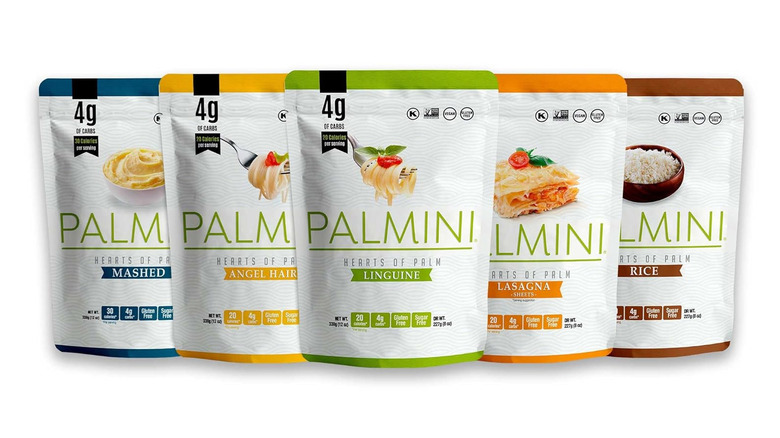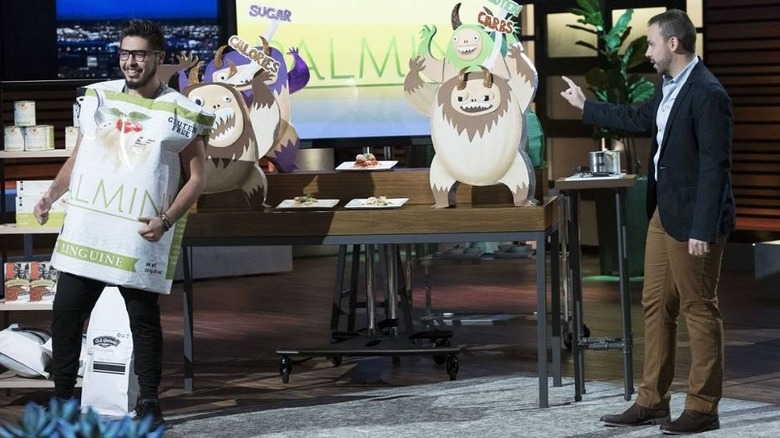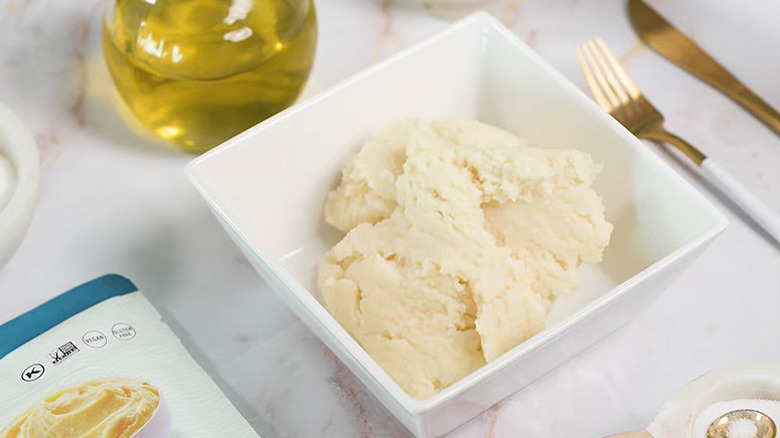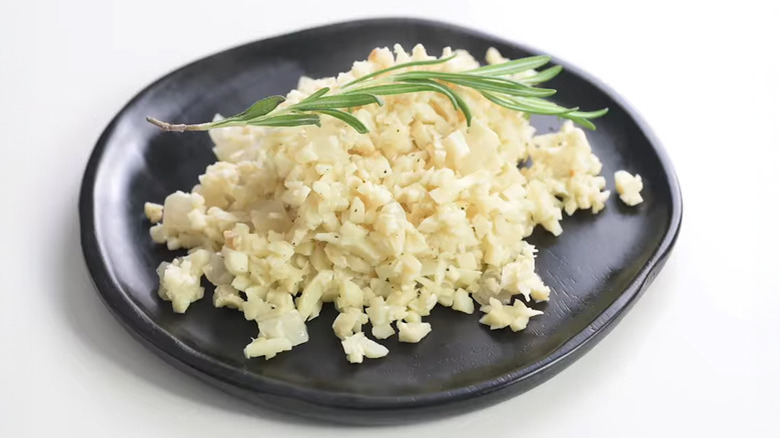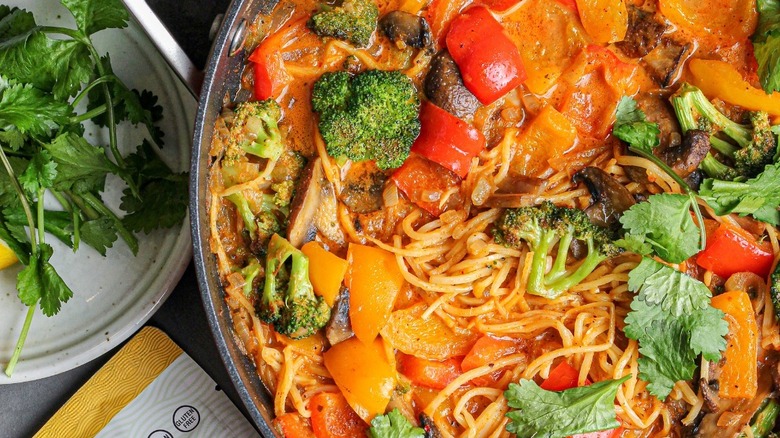Palmini: Here's What Happened After Shark Tank
Alfonso Tejada was born in Bolivia and came to the United States for business school. After graduating from the University of Florida, he returned to South America and started a company importing quinoa to the States. Quinoa was on the verge of becoming the next big thing, and his company O.A. Foods LLC was one of the first to recognize how popular it would become.
Tejada's knack for discerning up-and-coming food trends got him thinking about pasta alternatives like zucchini noodles, aka, zoodles. Together with his cousin, who owned a hearts of palm factory, he developed a gluten-free pasta alternative made entirely from the vegetable. It took the men two years to create a machine that could handle processing the hearts of palm into noodle shapes, and in 2017, the Palmini brand was launched.
Hearts of palm come from the innermost core of palm trees. Their flavor is similar to mild artichoke, making them a good stand-in for wheat-based pastas. Moreover, the vegetable is low in calories and carbohydrates, and is sugar-free. For Diabetics refraining from sugar, people with gluten sensitivities, or anyone following special diets like low-carb, keto, or paleo, Palmini makes it possible to keep the semblance of pasta on the menu.
Tejada had moderate success selling the product, but his goal was to expand and make it as big as quinoa had become. He turned to "Shark Tank" for a chance at the exposure and funds that could take Palmini to the next level.
What happened to Palmini on Shark Tank?
Alfonso Tejada appeared on "Shark Tank" on February 25, 2018, on Season 9, Episode 24. He asked for $300,000 in exchange for 10% of O.A. Foods — including Palmini as well as his quinoa label. His humorous pitch featured cardboard monsters representing the "bad dudes" in pasta, which were smacked around like piñatas by a man in a Palmini costume (via YouTube).
The Sharks enjoyed the presentation, but their reactions upon sampling the product elicited mixed reviews. Lori Greiner loved it while Robert Herjavec noted his disappointment at it not tasting like pasta. Daymond John agreed, calling it "just a different shaped vegetable," but Mark Cuban (who is leaving Shark Tank) responded with, "[t]here's a lot of good reasons to eat this instead of pasta" (via YouTube).
Guest Shark Bethenny Frankel felt the product was basically just a shredded vegetable, and that there was nothing stopping other companies from copying it. Tejada explained that his patent-pending machine had taken years to refine, and the process of creating the uniformly processed noodles was very difficult. Frankel, Herjavec, and John were even less impressed when Tejada disclosed that in the past three months, Palmini had only generated $50,000 in sales. Those three disinterested Sharks all tapped out. Greiner and Cuban, however, partnered to offer $300,000 for 30%. Tejada countered with 18%, then raised it to 20%. Once Greiner came back with an offer of 25%, it didn't take long for Tejada to accept.
Palmini after Shark Tank
Things couldn't have worked out better for Alfonso Tejada. Speaking with The Alligator, his former university's newspaper, he revealed that his company experienced the full force of the "Shark Tank" effect. Thanks to the exposure and attention brought about by being on the show, over 10,000 units of Palmini sold out almost immediately due to the extraordinary demand. In a savvy move employed while the company restocked, it offered pre-orders in an effort to not lose any potential sales while not disappointing its customers.
As sales continued to explode after its "Shark Tank" debut, Palmini skyrocketed to the number one spot in Amazon's grocery and gourmet category, beating over one million other items for the top spot. With the investors backing, the company was able to greatly expand its production, as well as its presence in brick-and-mortar stores — including getting stocked on the shelves at Whole Foods and Aldi markets.
The brand also made significant improvements to its product and packaging. In October 2018, it released its new pouch container. Whereas the mock-pasta previously came packed in cans that were easily dented, the new pouches were a quality control upgrade that addressed both customer and retailer feedback. Along with the new soft packs, Palmini also announced that it had improved the flavor, neutralizing its inherent hearts of palm taste. The new toned-down version was touted as being even more like real pasta than ever before.
Is Palmini still in business?
Palmini is still in business, and its products continue to rank as bestsellers on Amazon. Additionally, Alfonso Tejada has made good on his goals of growing the brand's availability, and it's now sold in thousands of locations nationwide as well as internationally. You can find Palmini at Kroger, Ralphs, Sprouts, Safeway, Winn-Dixie, Wegmans, Walmart, Meijer, Fresh Thyme Market, Price Chopper, QFC, Smith's, King Scoppers, Publix, Fry's, Fred Meyer, Kings, Whole Foods, and Thrive Market, among many others.
A plug on "The Dr. Oz Show" with natural foods chef Daphne Oz brought the brand another boost of national attention. This was followed by Palmini being chosen for the Gulfood Innovation Awards for Best New Product Development.
In the years since "Shark Tank," O.A Foods has introduced a number of new products to the Palmini line. Proving once again that hearts of palm are far more than just an underrated canned ingredient, the company's novel approach includes transforming it into rice and mashed not-potatoes. The pasta options are now available in classic varieties such as linguine, angel hair, as well as lasagna sheets. Rice flavors include plain as well as Spanish and fried rice — and the mashed potatoes come in roasted garlic, butter and herb, as well as cheddar and jalapeño. On the company's Eat Palmini website, you can also still purchase the company's quinoa along with a bag of chia seeds, sold under their own brand name, Greenfit.
What's next for Palmini?
Palmini's focus is still on expanding availability into more locations and growing its customer base. The company regularly uses social media to communicate with its large following. With 125,000 followers on Instagram, 38,000 on Facebook, and nearly 15,000 on TikTok, its messaging is certainly finding a receptive audience. On TikTok, it offers a discount code that can be used on the company website, and fans can visit Instagram and Facebook for recipe ideas illustrated with tantalizing food photography.
The business also uses social media for frequent giveaways and collaborations with influencers. In fact, its affiliate program actively recruits paid brand ambassadors, which it utilizes as another effective method for extending its reach and gaining new followers.
You can expect to see more new developments from Palmini to come, with Alfonso Tejada's future sights set on more novel approaches for transforming hearts of palm. You may even eventually see the pasta alternative being offered in restaurants. The company attends trade shows like the giant Natural Products Expo, where it provides samples of its latest products to potential new customers as well as industry retailers. The company has also released its second improved iteration of its more convenient, resealable pouch, but also continues to sell its products in BPA-free, recyclable cans. All Palmini hearts of palm items are made from cultivated palm trees, which are grown in a sustainable manner that does not contribute to deforestation, and its products are certified kosher, vegan, and non-GMO.

